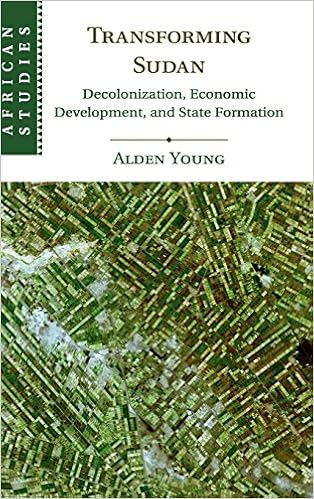The Economic Roots of Modern Sudan
Episode 466
As a site of recent civil wars, ethnic cleansing, and genocide, Sudan's history is often framed by violence. In this podcast, our guest Alden Young offers an alternative framing of Sudan's modern history, as we discuss Sudan's economy and its relationship to the broader Middle East from the 19th century onward. We discuss Sudan's unique experience of colonialism under Ottoman/Egyptian rule and how the issue of slavery intensified as Sudan's ties to Egypt and the broader Ottoman world intensified during the 19th century. We also discuss how colonial planners slowly reoriented Sudan's economy towards agricultural export and away from pastoralism. We explore the Gezira scheme, a long foretold irrigation project that would become the centerpiece of Sudanese economic development after independence during the 1950s. And we consider the fate of the class of Sudanese economists and technocrats who straddled the late colonial and postcolonial periods.
At the bottom of this post, we also offer an activity module for university classrooms based on this podcast, a documentary about the Gezira scheme from the 1950s, and the novel Season of Migration to the North by Sudanese author Tayeb Salih.
At the bottom of this post, we also offer an activity module for university classrooms based on this podcast, a documentary about the Gezira scheme from the 1950s, and the novel Season of Migration to the North by Sudanese author Tayeb Salih.
 | Click for RSS Feed | 
|

|
Contributor Bios
 |
Alden Young is Assistant Professor of African American Studies and a faculty member in the International Development Studies program at the University of California, Los Angeles. His first book Transforming Sudan: Decolonization, Economic Development and State Formation was published by Cambridge University Press in 2017. His current research project, Elite Retreat: The Making of Sudanese Political Economy and Business in the Era of Dollar Hegemony examines how Sudanese intellectuals and businessmen conceptualized the rise of the Arab Gulf beginning in the 1970s and sought or were compelled to build new economic, political and labor relationships between Sudan and the Gulf region.
|
 |
Chris Gratien is Assistant Professor of History at University of Virginia, where he teaches classes on global environmental history and the Middle East. He is currently preparing a monograph about the environmental history of the Cilicia region of the former Ottoman Empire from the 1850s until the 1950s. |
Further Listening
 |
Aaron Jakes | 475
9/7/20
|
Nationalism and Capitalism in British-Occupied Egypt |
 |
Eve Troutt Powell | 283
11/25/16
|
Narratives of Slavery in Late Ottoman Egypt |
 |
Omar Cheta | 265
9/1/16
|
Capitalism and the Courts in 19th Century Egypt |
 |
Muriam Haleh Davis | 278
11/3/16
|
Development, Race, and the Cold War in Algeria |
 |
Sara Pursley | 397
1/8/19
|
Crisis and Development in 20th Century Iraq |
 |
Michael Ferguson | 257
8/10/16
|
African Diaspora in Ottoman Izmir |
Credits
Episode No. 466
Release Date: 11 July 2020
Recording Location: Recorded remotely between East Syracuse, NY and Princeton, NJ
Music and Audio Elements (by order of appearance): Kai Engel - Augmentations; A.A. Aalto - Canyon; Soft and Furious - So What; "Independence Sudan" (1956) - British Pathe; They Planted A Stone (1954); مصر المحروسة - الطيب صالح; Aitua - The Trap
Sound production by Chris Gratien
Additional thanks to Sam Dolbee
Bibliography and images courtesy of Alden Young
Release Date: 11 July 2020
Recording Location: Recorded remotely between East Syracuse, NY and Princeton, NJ
Music and Audio Elements (by order of appearance): Kai Engel - Augmentations; A.A. Aalto - Canyon; Soft and Furious - So What; "Independence Sudan" (1956) - British Pathe; They Planted A Stone (1954); مصر المحروسة - الطيب صالح; Aitua - The Trap
Sound production by Chris Gratien
Additional thanks to Sam Dolbee
Bibliography and images courtesy of Alden Young
Bibliography
Publications of Alden Young
Transforming Sudan: Decolonization, Economic Development, and State Formation (Cambridge University Press, 2017)
with Michael Woldemariam, "After the Split: Partition, Successor States, and the Dynamics of War in the Horn of Africa," Journal of Strategic Studies Vol. 41:5 (2018): 684-720.
"Measuring the Sudanese Economy: A Focus on National Growth Rates and Regional Inequality, 1959-1964," Canadian Journal of Development Studies Vol 35:1 (2014): 44-60.
"African Bureaucrats and the Exhaustion of the Developmental State: Lessons from the Pages of the Sudanese Economist," Humanity: An International Journal of Human Rights, Humanitarianism, and Development 8:1 (2017): 49-75.
Further Reading
Brown, Marie Grace. Khartoum at Night: Fashion and Body Politics in Imperial Sudan. Stanford University Press, 2017.
Collins, Robert O. A History of Modern Sudan. Cambridge: Cambridge Univ. Press, 2010.
Powell, Eve M. Troutt. A Different Shade of Colonialism: Egypt, Great Britain, and the Mastery of the Sudan. Berkeley: Univ. of California Press, 2007.
Salih, al-Tayyib, Laila Lalami, and Denys Johnson-Davies. Season of Migration to the North. New York: New York Review of Books, 2009.
Sharkey, Heather J. Living with Colonialism: Nationalism and Culture in the Anglo-Egyptian Sudan. Berkeley: University of California Press, 2003.
Activity Module
The following series of activities is intended for use in university classrooms during a week dedicated to the history of Sudan. Alongside this podcast, it guides students through primary source analysis of the following works:
They Planted A Stone (1954), a short documentary directed by Robin Carruthers
Season of Migration to the North (1966), a novel by Tayeb Salih translated by Denys Johnson-Davies
For further context, we recommend students listen to "Narratives of Slavery in Late Ottoman Egypt" with Eve Troutt Powell hosted by Susanna Ferguson, Ottoman History Podcast, Ep. 283 (25 November 2016) http://www.ottomanhistorypodcast.com/2016/11/eve-troutt-powell.html.
Click here to access the activity module PDF
If you are using this activity module with your class get in touch with feedback about how it went and how we can improve the activity module












Comments
Post a Comment
Due to an overwhelming amount of spam, we no longer read comments submitted to the blog.